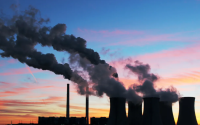Common Dreams / Published on Tueday, September 6, 2005 by the Agence France Presse
The Greenpeace environmental group denounced a UN report that radiation released from Ukraine's Chernobyl nuclear power plant nearly two decades ago may cause fewer deaths than expected as "whitewashing" the impact of the world's worst nuclear accident.
The United Nations report, which found that only 56 people have so far died and 4,000 may eventually perish from the effects of the disaster, was being discussed at a two-day conference in Vienna sponsored by the International Atomic Energy Association (IAEA).
"It is appalling that the IAEA is whitewashing the impacts of the most serious industrial accident in human history," said Jan Van de Putte, a Greenpeace nuclear campaigner, in a statement released by the organization's headquarters in Amsterdam.
"Denying the real implications is not only insulting the thousands of victims -- who are told (they are) sick because of stress and irrational fears -- but it also leads to dangerous recommendations, to relocating people in contaminated areas," Van de Putte said.
Greenpeace charged that a more careful reading of the 600-page report and other published research by UN bodies leads to a different conclusion.
The ecological group also cited omissions in the report. For example, it said that the 4,000 deaths only relate to a studied population of 600,000, whereas radiation was spread over most Europe and the report omits the impact on millions of Europeans.
Also the World Health Organization referred to a study of 72,000 Russian workers at the nuclear plant, but Greenpeace said the number of workers in Russia, Belarus and Ukraine was estimated at nearly 10 times that figure.
The report to be discussed by nuclear, health and development experts in Vienna concludes that out of more than 600,000 people who suffered the most exposure from the accident -- reactor staff, emergency and recovery personnel in 1986-87 and residents of the nearby areas -- an estimated 3,940 are expected to die from radiation-induced cancer and leukemia.






